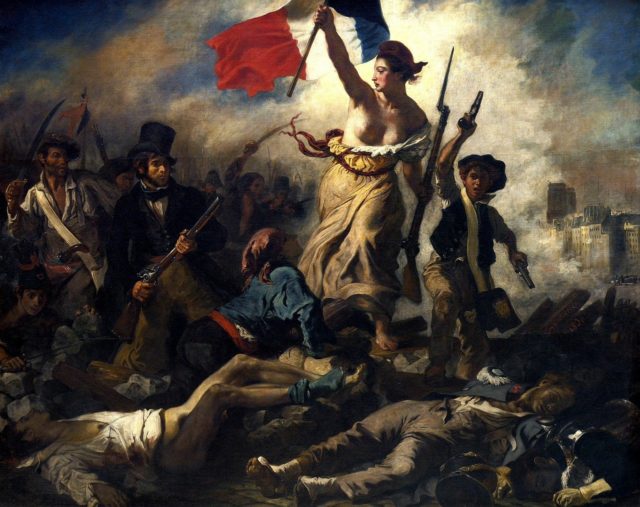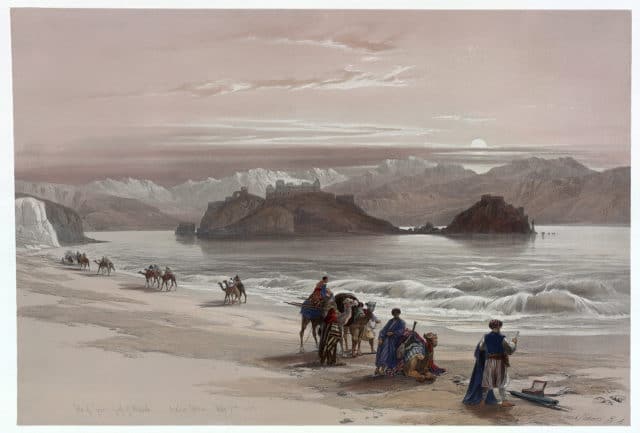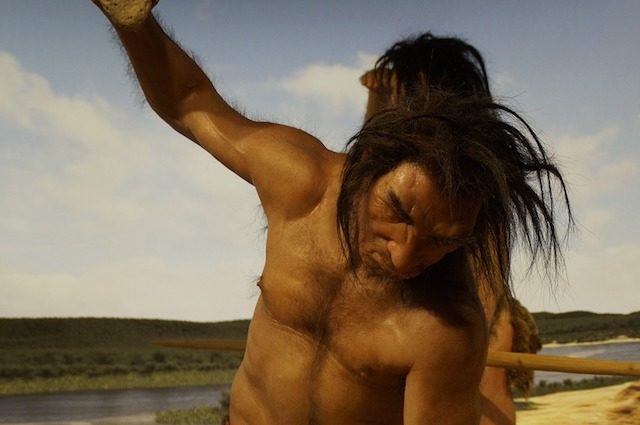The evolution of our species has been… eventful, to say the least. While some form of semi-bipedal hominids and apes have existed for millions of years, our march toward modern civilization began relatively recently. In a short period of time, our species has gone through many monumental changes that gradually gave shape to everything we see around us today.
While some of these crucial historical moments are intuitive and well known, others aren’t that obvious. Almost all of them, though, are only apparent in hindsight…
8. When We Stood Up On Two Feet

If we get down to the basics, there aren’t many differences between our closest, four-legged ancestors: the intelligent apes. Apart from minor differences and some chance mutations, we may never have never been able to stray too far from that lineage. Then, some forward-thinking ape – or a group of them – around two to four million years ago decided that standing up was a way better way to live, and we’ve not looked back since.
The decision to stand up on two feet instead of four may seem to be insignificant and intuitive to most, though if you think about it, it’s an unprecedented trait in the tree of life. Humans are the only creatures that have ever evolved to walk on two feet, even if its immediate evolutionary advantages aren’t clear to science. Regardless, bipedalism freed our hands to be able to make more complicated tools, setting the stage for everything to come, making it one of the most important steps in the evolution of early humans.
7. The Domestication Of The Horse

We have a long history of domesticating animals for our needs. From sheep to cows to our best friends, the dogs, the animal kingdom is full of examples of animals that we have tamed and modified, and that have played important roles in the rise of our civilization.
One domesticated species, however, has been so important for humanity that we’ve written entire books and historical journals on the topic: the horse. First domesticated some time around 3000 BC in the Central Asian steppes, the horse initially served as a good source of meat and fur, much like other livestock animals at the time. Soon, however, people realized that it could be used for movement across large distances like no other animal we’ve ever been able to tame. They may not have realized it at the time, but that realization would become one of humanity’s most pivotal. The histories of all the earliest and biggest Eurasian civilizations perfectly coincide with the history of horse domestication in their respective regions. The horse finally allowed us to step out of our limited range and inhabit far off regions.
Not just that, but it also played an important role in the militaries of almost all major armies until the invention of gunpowder. Horse cavalry was often the most powerful unit in major ancient and medieval armies, often deciding the course of a battle entirely on its own.
6. The Rise Of Homo Sapiens
Even if most of us may not realize this, humans weren’t always the only hominid species on the planet. We’re only one of the many different branches of humans to evolve out of intelligent apes, some of whom we may not yet even know about. Moreover, it wasn’t always obvious that we’d be the last ones standing, either. In fact, the exact circumstances that led us to emerge as the ultimate victors of the early hominid race aren’t that clear. Neanderthals, for example, were much stronger than our homo sapiens ancestors, and may even have been capable of designing tools as advanced as us.
Despite the mystery surrounding our early days, it’s clear that the evolutionary domination of homo sapiens over other hominid species was one of our most crucial early steps. It eliminated the only challenge to our hegemony on the planet – other humans – and directly paved the way for all of the biggest moments in our history since.
5. The Age Of Revolutions

While most of this list deals with evolutionary and technological developments, the story of humanity is incomplete without its political and cultural milestones. Where bigger brains and opposable thumbs gave us the physical tools to win the Darwinian race, our decisions with organizing our society, economy and politics have been equally influential in shaping up our civilization.
In that respect, the events in Europe in the 17th and 18th centuries are perhaps some of the most important in our social history. For the most part, the majority of humanity has lived in rigidly structured, hierarchical societies controlled by a handful of people with power.
That changed in the 17th century beginning with the French Revolution, and eventually spread to the rest of Europe and the world. The Industrial Revolution – an important moment in its own right – led to people demanding better rights and living conditions, culminating in the massive revolts seen across European workplaces in the late 17th and 18th centuries, including the colonies.
This period laid the foundation for the largely liberal, democratic and developed part of the world today, where the majority of the population is free from the threat of hunger or conflict. The revolutions such as the French Revolution, American Revolution, and the 1848 wave of Revolutions in western Europe triggered the the rearrangement of the society, economy, and political structure away from Feudalism and in the favor of the individual, giving way to all of our modern ideas of human rights, liberty, freedom of faith and so on.
4. The Islamic Golden Age

While Europe was the birthplace of some of the biggest social and political changes of the early modern era, the scientific revolution had already happened centuries before in a completely different region of the world.
The Golden Age of Islam – from seventh to the 13th century – was when we took the biggest leap forward in our scientific understanding of the world. Some of the earliest versions of most modern fields of science – such as medicine, flight, chemistry, astronomy, etc. – first developed in that region, thanks to scholars from around the world who were encouraged by the caliph and other local rulers. The period was so influential that, throughout that era, Arabic was the global language of science. That fact is evident in the vestiges of Arabic still found in much of our modern scientific lexicon; for example, algebra, alchemy, algorithm, and so on.
Unfortunately, all of that came to an abrupt end with the Mongol siege of Baghdad. Its library – the biggest in the world at the time – was burned to the ground. Regardless, the knowledge we gained from that period set the stage for some of our biggest scientific achievements since, such as the European age of exploration, industrial age, and steam engine.
3. The Great Leap Forward

For most people, it would probably come as a surprise that for the most part of our history, absolutely nothing was happening. Of course, there was that existential struggle with the other humans we mentioned above, though other than deciding the existential, yes/no fate of humanity, it didn’t do anything nuanced for the human race. For millions of years, homo sapiens and other human species had almost no major scientific breakthroughs. That was, however, until something happened around 60,000 years ago, when everything changed.
Archaeologists still find clear evidence of a massive leap in tool making technology, societal structure, language, art, and many other fields around that time, and have called it the Great Leap Forward. It’s possible that it may have been thanks to a language based mutation in our brains at the time, though for all we know for sure, it could have been something random, too. What we do know, however, is that the Great Leap Forward is a clear line separating us from the relatively primitive early men, and the species set to conquer the moon in the distant future.
2. Writing

While many people would consider the development of language to be a pretty important development in our history – and it absolutely is – it’s difficult to decide on a singular definition of ‘language’. Many ancient cultures communicated with systems of language that would be barely recognizable to us, but fulfilled all the criteria of what a language is supposed to be. People have been using some form of language to talk to each other for as long as we can remember.
Writing, however, can be considered to be a clear marker, as we can precisely tell when and where it first originated. It independently arose – at different points in history – in the Near East, China and Mesoamerica. All writing systems of today trace their roots to those first languages, as well as most cultures.
Writing gave a boost to human progress like nothing else, allowing us – for the first time in our history – to reliably record, manipulate, store and disseminate information. For example, generals could now write down the details of their battles, allowing future commanders to use that information in their own battles. Rulers could reliably send out their edicts without the risk of manipulation, and so on. Writing provided us with a way to use information like never before, and formed the basis for all of history’s most influential civilizations.
1. The Agricultural Revolution

While many historians and archaeologists take the view that the decision to settle down into farming societies – as opposed to hunter gatherer bands – was an obvious next step in human evolution. The early farmers would have had to undergo many massive changes in their everyday lives – like in diet, housing, societal structure, etc. – to stick to their new lifestyle. It wasn’t a clearly beneficial deal, and more and more experts are starting to question why we did it at all.
Its evolutionary benefits notwithstanding, the agricultural revolution was still a pivotal moment in human history. Because of farming, we could finally live longer, grow our population, and – most importantly – free a large part of the population from food production.
experts in other fields – like artists, bureaucrats, philosophers, military generals – gave way to even bigger, more successful civilizations, directly influencing how societies are structured even today.
2 Comments
You probably missed mentioning about fire. Fire has been the biggest game changer for humans.
When we only have 10 spaces, some things are bound to be omitted. 🙂